

Cultural anthropology. Cultural anthropology is a branch of anthropology focused on the study of cultural variation among humans and in contrast to the social anthropology perceives the cultural variation more as an independent "variable" than the dependent one.
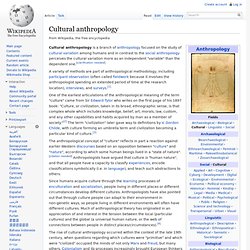
[clarification needed] A variety of methods are part of anthropological methodology, including participant observation (often called fieldwork because it involves the anthropologist spending an extended period of time at the research location), interviews, and surveys.[1] One of the earliest articulations of the anthropological meaning of the term "culture" came from Sir Edward Tylor who writes on the first page of his 1897 book: "Culture, or civilization, taken in its broad, ethnographic sense, is that complex whole which includes knowledge, belief, art, morals, law, custom, and any other capabilities and habits acquired by man as a member of society.
"[2] The term "civilization" later gave way to definitions by V. Theoretical foundations[edit] FROM STONE AGE MAN TO MODERN MAN. Evolution, Psychology and Culture. The human is by nature (instinct) a social animal.
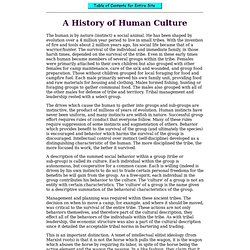
He has been shaped by evolution over a 4 million year period to live in small tribes. With the invention of fire and tools about 2 million years ago, his social life became that of a warrior/hunter. The survival of the individual and immediate family, in those harsh times, depended on the survival of the tribe. Even in these early times each human became members of several groups within the tribe. Females were primarily attached to their own children but also grouped with other females for camp maintenance, care of the sick and wounded, and group food preparation. RELIGION AND CULTURE. We are curious about ourselves, other people around us, and what it means to be alive or dead.

We ask questions and find answers that help assure us we have a good foundation of understanding about who we are. Anthropology is a social science that attempts to provide us with a better understanding of our humanness - what it means to be human. In order to understand this, we need to explore what we mean by culture because we rely on culture for our values, ways we think, ways we view the world around, ways to act properly.
We also need to understand that to be human means that we have a biological as well as a social side to us. We need a grasp of what both of these mean to us. What is Anthropology? These are: Anthropologists also tend to look for similarities and differences between people and their cultures. Doug Padgett. "In the anthropology of religion, as in many interpretive pursuits of our postmodern age, there is nowhere left to hide.

" James Boon Introduction and State of the Field According to Stephen Glazier (1997), one could easily arrive at the impression that in the discipline of anthropology as a whole, anthropology of religion is currently on the run. It is difficult to find programs that take anthropology of religion seriously, where one can do graduate work, where one can find professors for whom religion is a primary concern. But in the post-Cold War era, with rising levels of ethnic and religious conflict, the effects of religion, its impact on our social and political lives, have greater visibility than at any time in the past twenty years. Sociology of religion. List of religious populations. This is a list of religious populations by proportion and population.
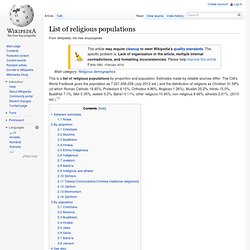
Estimates made by reliable sources differ. The CIA's World Factbook gives the population as 7,021,836,029 (July 2012 est.) and the distribution of religions as Christian 31.59% (of which Roman Catholic 18.85%, Protestant 8.15%, Orthodox 4.96%, Anglican 1.26%), Muslim 25.2%, Hindu 15.0%, Buddhist 7.1%, Sikh 0.35%, Jewish 0.2%, Baha'i 0.11%, other religions 10.95%, non-religious 9.66%, atheists 2.01%. (2010 est.).[1] Adherent estimates Adherents.com says "Sizes shown are approximate estimates, and are here mainly for the purpose of ordering the groups, not providing a definitive number".[3] Notes By proportion Christians. Evolutionary origin of religions. The evolutionary origin of religions theorizes about the emergence of religious behavior during the course of human evolution.
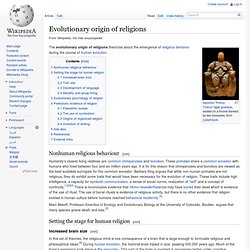
Nonhuman religious behaviour[edit] Humanity’s closest living relatives are common chimpanzees and bonobos. These primates share a common ancestor with humans who lived between four and six million years ago. It is for this reason that chimpanzees and bonobos are viewed as the best available surrogate for this common ancestor. Barbara King argues that while non-human primates are not religious, they do exhibit some traits that would have been necessary for the evolution of religion. Anthropology of religion. The anthropology of religion involves the study of religious institutions in relation to other social institutions, and the comparison of religious beliefs and practices across cultures.
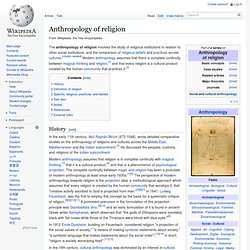
[citation needed] Modern anthropology assumes that there is complete continuity between magical thinking and religion,[1] and that every religion is a cultural product created by the human community that practices it.[2] History[edit] In the early 11th century, Abū Rayhān Bīrūnī (973-1048), wrote detailed comparative studies on the anthropology of religions and cultures across the Middle East, Mediterranean and the Indian subcontinent.[3] He discussed the peoples, customs, and religions of the Indian subcontinent.
Modern anthropology assumes that religion is in complete continuity with magical thinking,[1] that it is a cultural product,[4] and that is a phenomenon of psychological projection.